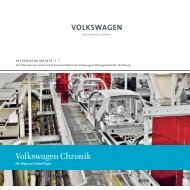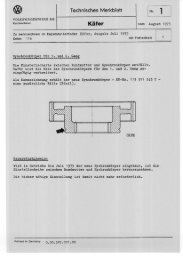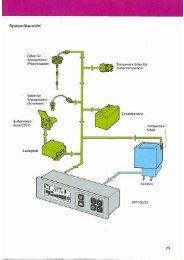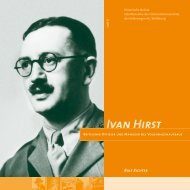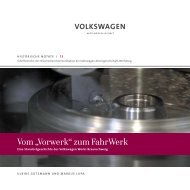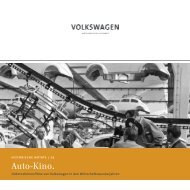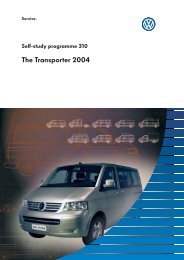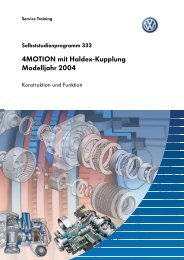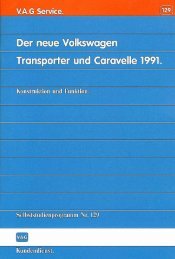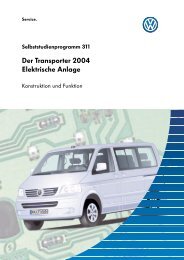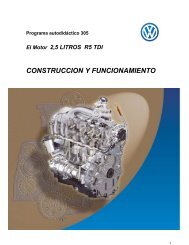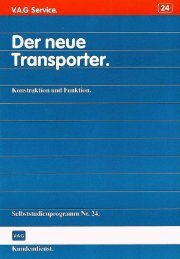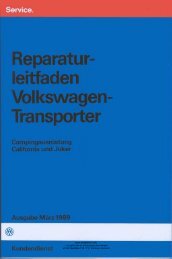HN 2: The British and their Works
HN 2: The British and their Works
HN 2: The British and their Works
You also want an ePaper? Increase the reach of your titles
YUMPU automatically turns print PDFs into web optimized ePapers that Google loves.
2.3<br />
<strong>Works</strong> council in the deficit economy<br />
At the instigation of Social Democrats <strong>and</strong> Communists a provisional<br />
works council for the Volkswagen plant was formed in<br />
July 1945, expressly referred to until December 1946 as the<br />
"Betriebsvertretung" (factory representation). <strong>The</strong> head of this<br />
body was the future mayor of Wolfsburg, Karl Hieber, who had<br />
chaired the works committee of a company in Mannheim for<br />
several years before the war <strong>and</strong> who now assumed an advisory<br />
role for the first VW works council. Although the <strong>British</strong> military<br />
government in Hanover had authorised the founding of the<br />
provisional employee representation, it did not grant the committee<br />
any rights of co-determination. <strong>The</strong> works council was<br />
permitted to concern itself with the care of former political<br />
prisoners, but could not exert any influence on personnel<br />
decisions or the distribution of heavy workers’ cards.<br />
Nevertheless, the <strong>British</strong> officers on site soon realised the value<br />
of an institution like this for settling differences between<br />
factory management <strong>and</strong> workers <strong>and</strong> reducing the potential<br />
for conflict among a diverse, amorphous workforce. 117 An<br />
employee representation also appealed to Ivan Hirst’s sense of<br />
democracy <strong>and</strong> co-operative style of leadership, which fostered<br />
direct, c<strong>and</strong>id contact with employees via "open door arrangements"<br />
<strong>and</strong> revealed a marked need for consensus. 118<br />
Major Ivan Hirst therefore supported the election of a nonparty-political,<br />
democratically authorised factory representation,<br />
<strong>and</strong> dissolved the old one in October 1945. <strong>The</strong> c<strong>and</strong>idates<br />
were required to maintain silence in regard to <strong>their</strong> party <strong>and</strong><br />
union membership, <strong>and</strong> to refrain from making overtly political<br />
statements. Under such restrictions, for example a socialdemocratic<br />
c<strong>and</strong>idate was described for campaign purposes as<br />
an "expert of calibre <strong>and</strong> discrimination" whose concern was for<br />
the welfare of all humanity. With the same members, the provisional<br />
factory representation became a democratically elected<br />
factory representation in November 1945. It adopted a set of<br />
internal rules <strong>and</strong> regulations, which was essentially restricted<br />
to the social care of the workforce. <strong>The</strong> activity of the works<br />
council was strictly regulated by the <strong>British</strong> factory management<br />
with an imposed constitution. <strong>The</strong> agenda for the works<br />
council meetings had to be submitted to Hirst for approval, <strong>and</strong><br />
the <strong>British</strong> were entitled to be present at the factory meetings.<br />
At the council meetings, discussions about politics <strong>and</strong> the<br />
management of the factory were forbidden. <strong>The</strong> employee<br />
representatives were permitted no rights of co-determination<br />
at this time; even in internal social matters, initially there were<br />
only rights of discussion <strong>and</strong> information. 119<br />
In the first two factory representation bodies the disputes<br />
between social democrats <strong>and</strong> communists were not especially<br />
noticeable, or at least no major conflicts are on record. By contrast,<br />
the election of the works council chairman in December<br />
1946 culminated in ructions. <strong>The</strong> KPD (Communist Party) felt<br />
boosted by the result of the works council elections, as it filled<br />
almost half of the seats. It challenged the social democrats’<br />
claim to leadership, <strong>and</strong> entered its c<strong>and</strong>idate Erwin Blöhm to<br />
fight the SPD c<strong>and</strong>idate Otto Peter. <strong>The</strong> first ballot resulted in a<br />
draw, but the second finally saw Peter elected. <strong>The</strong> communists<br />
thereupon disputed the proper conduct of the election, <strong>and</strong><br />
boycotted the next works council meeting in protest. However,<br />
48 49<br />
WORKS COUNCIL IN THE DEFICIT ECONOMY



